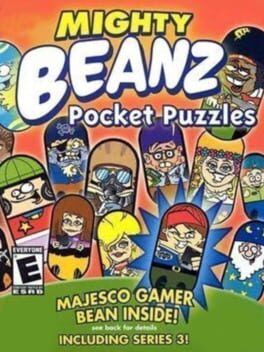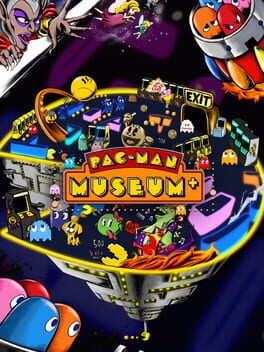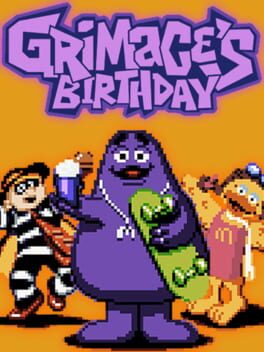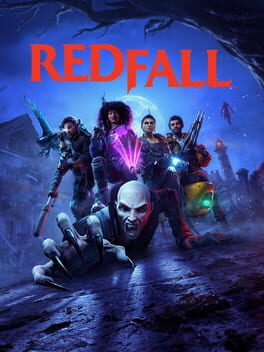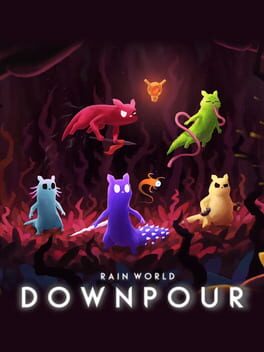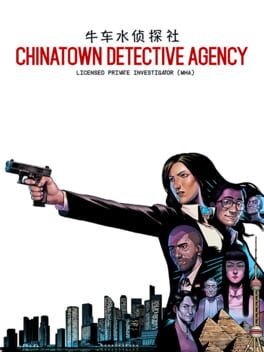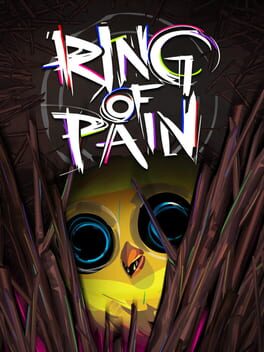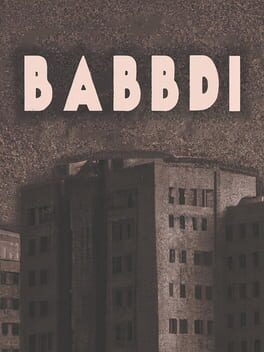vehemently
You know, there are a lot of issues with this site we're on, but it does result in a unique sort of exchange in tastes. Periodically checking the front page means I get to learn what other people are playing, what they might think of it, even if I don't know them particularly well. Sometimes, I see some game cross my feed that I've never heard of but piques my interest. Something unorthodox, or unpopular, or new. Maybe an obscure title on an old console, or a niche genre staple, or an independent artist pouring their heart and soul into a little game. This gives me an opportunity to expand my horizons, to discover art I'd maybe never had the thought of looking at, and seeing if I connect with it in the same way my peers do. Regardless of whether I like it or whether I agree, this interplay can be meaningful.
This is not one of those games. Festering convulsion of early aughts emanations, so pungently trapped in a corn-syrup time cube, a stagnant, icy rictus. Gave me bean dysmorphia. Probably caused a war. I don't want a "Majesco Gamer Bean". Fuck this game, fuck me for playing it, fuck whoever put it on my feed, and fuck you for participating
This is not one of those games. Festering convulsion of early aughts emanations, so pungently trapped in a corn-syrup time cube, a stagnant, icy rictus. Gave me bean dysmorphia. Probably caused a war. I don't want a "Majesco Gamer Bean". Fuck this game, fuck me for playing it, fuck whoever put it on my feed, and fuck you for participating
2022
2006
2023
1991
u want to go on a date with me? okay, first meet me at the CARNIVAL at the TROGGLE SHOOT so i can TRAP U on my MAGICAL PUZZLE ISLAND and i've turned u into a LIVING KEWPIE where the only way to escape is to solve all my MYSTERIOUS RIDDLES so u can concoct a MYSTICAL PURPLE POTION in a COMICALLY LARGE CAULDRON that will RESTORE UR FORM by BARFING URSELF UP back into the CARNIVAL and then ur ELIGIBLE
2023
vampirism gives you yaoi hands
---
I wish I could just start and end with that joke, but unfortunately I feel compelled to say more. I truly do not think the hate this game is getting is merited. Redfall is not good, but it will not be the worst game you play this year. I think it is tempting to say that Arkane Austin was meddled with and their vision was compromised by corporate overlords, or that the release was too rushed, which I’m sure is all true to some degree, but I’m not convinced that these are the core issues with Redfall. I think the issue is that this game is just too many things. This game is trying to be at least three completely different games and is none of them well. The loot system is a cavalcade of junk, the co-op is hectic and empty, and the open world stuff, the only stuff that comes close to succeeding, is bogged down by those other two. The vampires aren’t enough of a threat to be exciting to fight by the late game, and some of your powers are sort of busted. The fact that co-op was marketed so hard on this is utterly baffling, because I truly think this game is only ever fun playing solo. Any of the friction that arises from playing carefully vanishes when you’re running around with three other players. You can’t read diaries or look at environmental storytelling when your friend is just bee-lining to the next waypoint. There are a few really cool moments in this game that would be utterly ruined in a four-stack. If they hadn’t been trying to make that work, maybe they could have devoted resources to making the weaker elements stronger. (Though I still think the game shouldn’t have done loot the way they did.) There are moments where I can see a version of this game that works, when I’m skulking through dilapidated mansions or scoping out a cultist camp. I also think there is a legitimate novelty for a vampire story to not have the vampires be sexy socialites and instead just be straight-up ghouls. The vampire gods in Redfall are capitalist Nosferatus who run a version Theranos that is even more evil somehow. Each of them is shitty in their own way and you do definitely want to see these fucks dead by the end. And I did play it to the end, because I have brain problems. Do I regret it? A bit. I think I would have gotten more out of another game, but I do not think Redfall is a horrible, unplayable game. I had some fun here and there. It’s just such a mess of competing design paradigms that it turns into a giant pile of oatmeal. And boy, am I stuffed!
---
I wish I could just start and end with that joke, but unfortunately I feel compelled to say more. I truly do not think the hate this game is getting is merited. Redfall is not good, but it will not be the worst game you play this year. I think it is tempting to say that Arkane Austin was meddled with and their vision was compromised by corporate overlords, or that the release was too rushed, which I’m sure is all true to some degree, but I’m not convinced that these are the core issues with Redfall. I think the issue is that this game is just too many things. This game is trying to be at least three completely different games and is none of them well. The loot system is a cavalcade of junk, the co-op is hectic and empty, and the open world stuff, the only stuff that comes close to succeeding, is bogged down by those other two. The vampires aren’t enough of a threat to be exciting to fight by the late game, and some of your powers are sort of busted. The fact that co-op was marketed so hard on this is utterly baffling, because I truly think this game is only ever fun playing solo. Any of the friction that arises from playing carefully vanishes when you’re running around with three other players. You can’t read diaries or look at environmental storytelling when your friend is just bee-lining to the next waypoint. There are a few really cool moments in this game that would be utterly ruined in a four-stack. If they hadn’t been trying to make that work, maybe they could have devoted resources to making the weaker elements stronger. (Though I still think the game shouldn’t have done loot the way they did.) There are moments where I can see a version of this game that works, when I’m skulking through dilapidated mansions or scoping out a cultist camp. I also think there is a legitimate novelty for a vampire story to not have the vampires be sexy socialites and instead just be straight-up ghouls. The vampire gods in Redfall are capitalist Nosferatus who run a version Theranos that is even more evil somehow. Each of them is shitty in their own way and you do definitely want to see these fucks dead by the end. And I did play it to the end, because I have brain problems. Do I regret it? A bit. I think I would have gotten more out of another game, but I do not think Redfall is a horrible, unplayable game. I had some fun here and there. It’s just such a mess of competing design paradigms that it turns into a giant pile of oatmeal. And boy, am I stuffed!
go to mansion
look at lawn
investigate lawn
look at grass
look at stairs
look at the lawn
reach down and touch the yard
investigate the thing on the lawn
look at the glimmer by the stairs
touch the sparkle
touch object by stairs
investigate sparkle
investigate object
get thing over there
get thing
tell Yasu to get thing
tell Yasu to get the thing on the lawn
tell Yasu to investigate lawn
reach down and touch the grass
please look at lawn
please look at the lawn
please look around
help
help me
help me please
slap Yasu
look at lawn
investigate lawn
look at grass
look at stairs
look at the lawn
reach down and touch the yard
investigate the thing on the lawn
look at the glimmer by the stairs
touch the sparkle
touch object by stairs
investigate sparkle
investigate object
get thing over there
get thing
tell Yasu to get thing
tell Yasu to get the thing on the lawn
tell Yasu to investigate lawn
reach down and touch the grass
please look at lawn
please look at the lawn
please look around
help
help me
help me please
slap Yasu
2023
Some of the most fun I’ve had with a game in years was learning how to kill lizards in Rain World. In my entire time with the game in my first playthroughs, I’m not sure I ever intentionally killed one of these beasts. I saw them as impossible foes. But in order to reach many of my goals in Downpour, I had to learn how to conquer them. The first kill feels like a fluke, like luck, and in a way it is. But each spear that pierces their hide feels more real, more earned. They never stop being terrifying. They never stop being a threat. But I had to learn how to take them down anyway, backflipping, juking, stabbing, feasting. I had to learn how to slay dragons.
I have a brand, and part of that brand is that I really like Rain World. In all my poetic waxings, I often am remiss to mention what makes playing Rain World itself actually so cool. So for once, I’ll try to offer an admittedly vague explanation. I’m sure you can find no shortage of mechanical rundowns, so I’ll keep this brief: Rain World is a unique game where you play as a little slugcat trying to survive and find shelter before the devastating rain comes. It’s quite a difficult game where challenges may often feel insurmountable. What makes Rain World such a unique game is its emphasis on emergent and procedural systems. The vast majority of these systems are not explained to the player at all, and as such have to be learned by experimentation and exploration. The behavior and animations of all the predators and creatures you encounter is unpredictable and dynamic. The game is a bountfiul garden of consistently surprising gameplay.
The result, for me, is something unlike anything else: a constantly exciting game. It’s always a thrill playing Rain World. Even dozens of hours in, I find myself yelping and gritting my teeth. I can get into specifics but I don’t want to dispel the magic of experiencing it yourself. I adore this. It can also end up making making the game agonizing. This is why initial critical response was negative, and why many players will find the game simply too hard or too cruel to even play let alone enjoy. But that agony is a part of the experience, or at least my experience, and it’s part of what makes the slugcat’s journey so beautiful.
So what about Downpour? This is an expansion that adds a litany of new features. If you just want a straight recommendation, I don’t advise going into anything related to the expansion before playing the base game. It’s not a required expansion and frankly is extremely geared towards die-hard fans. Most of my time was spent with the new slugcats, but they also added co-op, Expedition mode, challenges, and other stuff. A major addition to the game was Remix, a suite of new options that is available to owners of the base game. This alone makes recommending Rain World significantly easier, because it now comes with a big list of checkboxes that can help you tailor the game to your own needs. (If you want help figuring out what to use, check out my forum post here.)
Now, there is a criticism that Downpour in many ways actually distorts and weakens the unique core identity of Rain World. I’m torn on this. On one hand, I think it’s a bit paranoid. Even with an expansion (which is still optional!), Rain World remains a singular game like no other. Hunter and Monk were already additions and didn’t distort that vision. On the other hand, this game has a lot of things in it. There’s five new campaigns, a bunch of new game modes, and major additions to the map. There’s a chunk of community easter eggs, which frankly rubs me the wrong way, and the involvement of fandom in art can get ugly fast. The expansion also ends up adding a fair bit to the lore and narrative, and I don’t have simple feelings about some of the choices. (I won’t get into it for spoiler reasons, but there are some big swings that I don’t love.) It’s so much that I couldn’t possibly cover it all, and all the implications and complications in this review; even what I’ve written here is longer than I wanted. I wanted to just talk about the lizards, but this is too dense with content that I can’t just leave it at that. I would never go as far to say that Downpour ruins or fundamentally changes Rain World, but it does definitely add a lot to the mix.
There’s a reason for all this. Let’s talk a bit about the history here: years ago, some Rain World modders began developing the More Slugcats mod, which would add new playable slugcats to the game. Eventually, Videocult took these folks onto the team directly and made the expansion official. This, perhaps, explains why there is a sort of eagerness and lack of restraint to the expansion. The developers have announced intent to continue working on Rain Word, though I get the sense that this will mostly be the Downpour team and not the Videocult duo. I won’t lie that this concerns me; I don’t necessarily want to see this game endlessly expanded. I’m still waiting on the Signal project, and I want to see what else these teams are capable of putting together.
I think part of this comes from the fact that I don’t really engage with games in the way a lot of others seem to. For some people, Rain World is there forever game. I don’t want a forever game. I don’t generally seek to play a game for an indeterminately long amount of time. When I see credits on a roguelite, that’s generally when I stop playing. I am so puzzled when I see people gripe about growing tired of something after several hundred hours in a game. Even my favorite games of all time I generally do not return to ad nauseaum.
But that’s sort of why Downpour ends up making me happy. In spite of some of my concerns and gripes. A messier Rain World is still Rain World, and Rain World is good. And at the end of the day, Downpour gave me a reason to play one of my favorite games again. It gave me a reason to learn how to slay dragons. And that’s worth a hell of a lot.
I have a brand, and part of that brand is that I really like Rain World. In all my poetic waxings, I often am remiss to mention what makes playing Rain World itself actually so cool. So for once, I’ll try to offer an admittedly vague explanation. I’m sure you can find no shortage of mechanical rundowns, so I’ll keep this brief: Rain World is a unique game where you play as a little slugcat trying to survive and find shelter before the devastating rain comes. It’s quite a difficult game where challenges may often feel insurmountable. What makes Rain World such a unique game is its emphasis on emergent and procedural systems. The vast majority of these systems are not explained to the player at all, and as such have to be learned by experimentation and exploration. The behavior and animations of all the predators and creatures you encounter is unpredictable and dynamic. The game is a bountfiul garden of consistently surprising gameplay.
The result, for me, is something unlike anything else: a constantly exciting game. It’s always a thrill playing Rain World. Even dozens of hours in, I find myself yelping and gritting my teeth. I can get into specifics but I don’t want to dispel the magic of experiencing it yourself. I adore this. It can also end up making making the game agonizing. This is why initial critical response was negative, and why many players will find the game simply too hard or too cruel to even play let alone enjoy. But that agony is a part of the experience, or at least my experience, and it’s part of what makes the slugcat’s journey so beautiful.
So what about Downpour? This is an expansion that adds a litany of new features. If you just want a straight recommendation, I don’t advise going into anything related to the expansion before playing the base game. It’s not a required expansion and frankly is extremely geared towards die-hard fans. Most of my time was spent with the new slugcats, but they also added co-op, Expedition mode, challenges, and other stuff. A major addition to the game was Remix, a suite of new options that is available to owners of the base game. This alone makes recommending Rain World significantly easier, because it now comes with a big list of checkboxes that can help you tailor the game to your own needs. (If you want help figuring out what to use, check out my forum post here.)
Now, there is a criticism that Downpour in many ways actually distorts and weakens the unique core identity of Rain World. I’m torn on this. On one hand, I think it’s a bit paranoid. Even with an expansion (which is still optional!), Rain World remains a singular game like no other. Hunter and Monk were already additions and didn’t distort that vision. On the other hand, this game has a lot of things in it. There’s five new campaigns, a bunch of new game modes, and major additions to the map. There’s a chunk of community easter eggs, which frankly rubs me the wrong way, and the involvement of fandom in art can get ugly fast. The expansion also ends up adding a fair bit to the lore and narrative, and I don’t have simple feelings about some of the choices. (I won’t get into it for spoiler reasons, but there are some big swings that I don’t love.) It’s so much that I couldn’t possibly cover it all, and all the implications and complications in this review; even what I’ve written here is longer than I wanted. I wanted to just talk about the lizards, but this is too dense with content that I can’t just leave it at that. I would never go as far to say that Downpour ruins or fundamentally changes Rain World, but it does definitely add a lot to the mix.
There’s a reason for all this. Let’s talk a bit about the history here: years ago, some Rain World modders began developing the More Slugcats mod, which would add new playable slugcats to the game. Eventually, Videocult took these folks onto the team directly and made the expansion official. This, perhaps, explains why there is a sort of eagerness and lack of restraint to the expansion. The developers have announced intent to continue working on Rain Word, though I get the sense that this will mostly be the Downpour team and not the Videocult duo. I won’t lie that this concerns me; I don’t necessarily want to see this game endlessly expanded. I’m still waiting on the Signal project, and I want to see what else these teams are capable of putting together.
I think part of this comes from the fact that I don’t really engage with games in the way a lot of others seem to. For some people, Rain World is there forever game. I don’t want a forever game. I don’t generally seek to play a game for an indeterminately long amount of time. When I see credits on a roguelite, that’s generally when I stop playing. I am so puzzled when I see people gripe about growing tired of something after several hundred hours in a game. Even my favorite games of all time I generally do not return to ad nauseaum.
But that’s sort of why Downpour ends up making me happy. In spite of some of my concerns and gripes. A messier Rain World is still Rain World, and Rain World is good. And at the end of the day, Downpour gave me a reason to play one of my favorite games again. It gave me a reason to learn how to slay dragons. And that’s worth a hell of a lot.
2023
Atomic Heart wants desperately to be like Bioshock Infinite. Everyone knows this. Everyone says this. It oozes it from the first seconds of the game, pushing you through an idyllic world-building hallway in a floating city before everything turns to shit and the havoc begins. There’s even a fucking lighthouse. It’s so obvious it’s actually pathetic. The Bioshock series (itself deferred to System Shock 2) is sort of messy, wrapped up in gestures towards depth, both narratively and mechanically, that are ultimately flat. And this hit an apex with Bioshock Infinite, a game I truly despise, which was utterly vapid and utterly hateful. When it comes to depth, these are the equivalent of a Road Runner tunnel painted on a wall. So what of Atomic Heart? What happens when you imitate an imitation?
There’s that famous Putin quote, “Anyone who doesn't regret the passing of the Soviet Union has no heart. Anyone who wants it restored has no brains.” I doubt I will ever really understand this sentiment; I’m not Russian and my ancestors left there long ago. But Atomic Heart is the most I’ve ever seen it manifest. The game is fascinated by Soviet aesthetics, the socialist realism, the hammers and sickles, but rejects the values that formed them. Marx statues and Lenin busts are easy to find, but they’re just set dressing. It loves the utopic visions of Soviet communism, but is disgusted by its own nostalgia. It is trapped pining for the aesthetics of past without its politics. It wants badly to be able to be superficial.
I struggle to explain the exact way this game is so facile. At first I say that Atomic Heart isn’t sophisticated enough to really have an ideology, but that’s not true. Everything has an ideology, and this game often makes it very clear where it’s coming from. So, maybe it’s not sophisticated enough to have a message. Okay, maybe, but it definitely seems to be trying to. So I just land on this: Atomic Heart is not very smart. It really, really thinks it is. But it’s just not.
Dumb games aren’t intrinsically bad, but I think Atomic Heart is. Like, look, aesthetics count for more than most of us want to admit. And, if nothing else, Atomic Heart has a stunning visual style. The robot designs are creative and eerie (and sometimes horny), and the environmental design is almost Seussian at times. That’s why this game’s trailers blew up: it looks sick. If this game was all looks and middling gameplay, I wouldn’t be writing this. Hell, I might be doing a cheeky review of Pink Floyd’s Atom Heart Mother, instead. But it’s worse.
The problem is that this game never shuts the fuck up. It’s annoying bland protag never stops talking. The glove never stops talking. It does the time honored faux pas of complaining about mechanics it makes you perform. The motherfucker keeps saying “crispy critters” like he’s trying to make it a thing. I tried to play the game with Russian audio but the constant chattering made the game almost impossible even with subtitles. The game is very much interested in its plot and its plot fucking sucks. All of its twists are predictable and none of its ideas are new. Some twists are cribbed directly from Bioshock. I’m withholding some of the absurd spoilers, but there are a few moments that had me laughing to myself, saying, “I hate this game.” And god, it really is not that original. It’s the most run of the mill sci-fi plot you could have cooked up for this game. Its beats are so obvious and so rote. I think the glove literally quotes Animal Farm at you. It’s so fucking annoying. The messages, vapid as they are, are hammered repeatedly and obnoxiously, conveying its shitty politics piecemeal. And its politics really are shitty. There’s the undercurrent of nationalism and of anti-collectivism. This is not to mention the way female-coded robots are sexualized, and the apparent presence of anti-Ukrainian propaganda. I’ve even been told there’s a racist caricature hidden away somewhere in the cartoons that run on loop in this game. It is dripping in bad vibes.
And you know, I’d love to sit here and virtue signal about how I reviled the game and hated every moment, sneering “mid” and patting myself on the back. But I’d be pretending. Because there are fun moments to this trash heap. Like, yeah, it’s a 2010-ass game in a lot of ways (linear, parkour, quicktime events, minigames), but with a post-boomer revival combat sensibility (fast, hard, lots of enemies) and I don’t think it really quite works all said. I could get into it, but I won’t. Regardless, there’s glimmers. Even beyond art assets. In particular, there are some unique mechanical elements to the robot ecosystem. Granny Zina is cool (it would have been a better game if we could play as her). And I actually really liked most of the conversations with the corpses. There are brief moments, when they finally choose to shut the fuck up, where I had genuine fun. But those moments felt rare, where I was left to my devices to revel in silent aesthetics and mechanics, in a constant deluge of its overbearing sci-fi shenanigans and questionable choices, and by the end, all I could remember was the muck.
But doesn’t this all remind you of something? An alternate history sci-fi game, that had really impressive trailers to garner interest, with a very strong art direction admittedly steeped with nationalist visions of the past, that is an extremely watered down immersive sim, that is so enamored with its cliched plot about free will filled with garbage politics, where the game pontificates about agency while robbing you of it and espousing empty platitudes about power, with constant dumb twists and undercurrent of misogyny and centrism, resulting in a game that is inexplicably lauded despite all its glaring flaws and horrendous pretensions?
Atomic Heart wants desperately to be like Bioshock Infinite. And the worst part is, it’s succeeding.
There’s that famous Putin quote, “Anyone who doesn't regret the passing of the Soviet Union has no heart. Anyone who wants it restored has no brains.” I doubt I will ever really understand this sentiment; I’m not Russian and my ancestors left there long ago. But Atomic Heart is the most I’ve ever seen it manifest. The game is fascinated by Soviet aesthetics, the socialist realism, the hammers and sickles, but rejects the values that formed them. Marx statues and Lenin busts are easy to find, but they’re just set dressing. It loves the utopic visions of Soviet communism, but is disgusted by its own nostalgia. It is trapped pining for the aesthetics of past without its politics. It wants badly to be able to be superficial.
I struggle to explain the exact way this game is so facile. At first I say that Atomic Heart isn’t sophisticated enough to really have an ideology, but that’s not true. Everything has an ideology, and this game often makes it very clear where it’s coming from. So, maybe it’s not sophisticated enough to have a message. Okay, maybe, but it definitely seems to be trying to. So I just land on this: Atomic Heart is not very smart. It really, really thinks it is. But it’s just not.
Dumb games aren’t intrinsically bad, but I think Atomic Heart is. Like, look, aesthetics count for more than most of us want to admit. And, if nothing else, Atomic Heart has a stunning visual style. The robot designs are creative and eerie (and sometimes horny), and the environmental design is almost Seussian at times. That’s why this game’s trailers blew up: it looks sick. If this game was all looks and middling gameplay, I wouldn’t be writing this. Hell, I might be doing a cheeky review of Pink Floyd’s Atom Heart Mother, instead. But it’s worse.
The problem is that this game never shuts the fuck up. It’s annoying bland protag never stops talking. The glove never stops talking. It does the time honored faux pas of complaining about mechanics it makes you perform. The motherfucker keeps saying “crispy critters” like he’s trying to make it a thing. I tried to play the game with Russian audio but the constant chattering made the game almost impossible even with subtitles. The game is very much interested in its plot and its plot fucking sucks. All of its twists are predictable and none of its ideas are new. Some twists are cribbed directly from Bioshock. I’m withholding some of the absurd spoilers, but there are a few moments that had me laughing to myself, saying, “I hate this game.” And god, it really is not that original. It’s the most run of the mill sci-fi plot you could have cooked up for this game. Its beats are so obvious and so rote. I think the glove literally quotes Animal Farm at you. It’s so fucking annoying. The messages, vapid as they are, are hammered repeatedly and obnoxiously, conveying its shitty politics piecemeal. And its politics really are shitty. There’s the undercurrent of nationalism and of anti-collectivism. This is not to mention the way female-coded robots are sexualized, and the apparent presence of anti-Ukrainian propaganda. I’ve even been told there’s a racist caricature hidden away somewhere in the cartoons that run on loop in this game. It is dripping in bad vibes.
And you know, I’d love to sit here and virtue signal about how I reviled the game and hated every moment, sneering “mid” and patting myself on the back. But I’d be pretending. Because there are fun moments to this trash heap. Like, yeah, it’s a 2010-ass game in a lot of ways (linear, parkour, quicktime events, minigames), but with a post-boomer revival combat sensibility (fast, hard, lots of enemies) and I don’t think it really quite works all said. I could get into it, but I won’t. Regardless, there’s glimmers. Even beyond art assets. In particular, there are some unique mechanical elements to the robot ecosystem. Granny Zina is cool (it would have been a better game if we could play as her). And I actually really liked most of the conversations with the corpses. There are brief moments, when they finally choose to shut the fuck up, where I had genuine fun. But those moments felt rare, where I was left to my devices to revel in silent aesthetics and mechanics, in a constant deluge of its overbearing sci-fi shenanigans and questionable choices, and by the end, all I could remember was the muck.
But doesn’t this all remind you of something? An alternate history sci-fi game, that had really impressive trailers to garner interest, with a very strong art direction admittedly steeped with nationalist visions of the past, that is an extremely watered down immersive sim, that is so enamored with its cliched plot about free will filled with garbage politics, where the game pontificates about agency while robbing you of it and espousing empty platitudes about power, with constant dumb twists and undercurrent of misogyny and centrism, resulting in a game that is inexplicably lauded despite all its glaring flaws and horrendous pretensions?
Atomic Heart wants desperately to be like Bioshock Infinite. And the worst part is, it’s succeeding.
2020
Ring of Pain is consistently identified as a card game, because enemies and items appear as, well, rectangles that quite honestly look an awful lot like cards. But I think this sort of misses what's actually going on: Ring of Pain is a one-dimensional dungeon crawler. At each given moment, you only have two choices of where to go: left or right. This leads to a kind of quick, frictionless pace that feels really effortless to dive into. This doesn't mean the game doesn't have depth; the game adds a lot of wrinkles and complexity through both deterministic and randomized variables thrown in and offers more kinds of junctures through equipment and path choices. Still, there is sometimes a feeling that there is something lacking, not necessarily in strategic depth, but in ideas. The narrative felt to me to be yet another pseudo-psychological puppet show and at a certain point it felt like the game didn't have much more to surprise me with. It felt at the end to be a numbers game. That's fine, but it does dull the experience. Ring of Pain is good fun, and a creative twist on the dungeon crawl. It's a nice diversion, but unfortunately, that one-dimensionality isn't just spatial.
2022
"My objective was solely archaeological. I would hunt these gray forms until they would transmit to me a part of their mystery, a part of the secret few phrases could sum up: why would these extraordinary constructions, compared to the seaside villas, not be perceived or even recognized? Why this analogy between the funeral archetype and military architecture? Why this insane situation looking out over the ocean? This waiting before the infinite oceanic expanse?...
...Why speak of "brutalism"? And, above all, why this ordinary habitat, so very ordinary over so many years?
These heavy gray masses with sad angles and no openings - excepting the air inlets and several staggered entrances - brought to light much better than many manifestos the urban and architectural redundancies of the postwar period that had just reconstructed to a tee the destroyed cities. The antiaircraft blockhouses pointed up another lifestyle, a rupture in the apprehension of the real. The blue sky had once been heavy with the menace of rumbling bombers, spangled too with the deafening explosions of artillery fire. This immediate comparison between the urban habitat and the shelter, between the ordinary apartment building and the abandoned bunker in the heart of the pores through which I was traveling, was as strong as a confrontation, a collage of two dissimilar realities. The antiaircraft shelters spoke to me of men's anguish and the dwellings of the normative systems that constantly reproduce the city, the cities, the urbanistic.
The blockhouses were anthropomorphic; their figures recalled those of bodies. The residential units were but arbitrary repetitions of a model, a single, identical, orthogonal, parallelepipedal model. The casemate, so easily hidden in the hollow of the coastal countryside, was scandalous here, and its naturalness was due less to the originality of its silhouette than to the extreme triviality of the surrounding architectural forms. The curved profile brought with it into the harbor's quarters a trace of the curves of dunes and nearby hills, and there, in this naturalness, was the scandal of the bunker...
...Slowed down in his physical activity but attentive, anxious over the catastrophic probabilities of his environment, the visitor in this perilous place is beset with a singular heaviness; in fact he is already in the grips of that cadaveric rigidity from which the shelter was designed to protect him. "
- Paul Virilio, Bunker Archaeology
...Why speak of "brutalism"? And, above all, why this ordinary habitat, so very ordinary over so many years?
These heavy gray masses with sad angles and no openings - excepting the air inlets and several staggered entrances - brought to light much better than many manifestos the urban and architectural redundancies of the postwar period that had just reconstructed to a tee the destroyed cities. The antiaircraft blockhouses pointed up another lifestyle, a rupture in the apprehension of the real. The blue sky had once been heavy with the menace of rumbling bombers, spangled too with the deafening explosions of artillery fire. This immediate comparison between the urban habitat and the shelter, between the ordinary apartment building and the abandoned bunker in the heart of the pores through which I was traveling, was as strong as a confrontation, a collage of two dissimilar realities. The antiaircraft shelters spoke to me of men's anguish and the dwellings of the normative systems that constantly reproduce the city, the cities, the urbanistic.
The blockhouses were anthropomorphic; their figures recalled those of bodies. The residential units were but arbitrary repetitions of a model, a single, identical, orthogonal, parallelepipedal model. The casemate, so easily hidden in the hollow of the coastal countryside, was scandalous here, and its naturalness was due less to the originality of its silhouette than to the extreme triviality of the surrounding architectural forms. The curved profile brought with it into the harbor's quarters a trace of the curves of dunes and nearby hills, and there, in this naturalness, was the scandal of the bunker...
...Slowed down in his physical activity but attentive, anxious over the catastrophic probabilities of his environment, the visitor in this perilous place is beset with a singular heaviness; in fact he is already in the grips of that cadaveric rigidity from which the shelter was designed to protect him. "
- Paul Virilio, Bunker Archaeology
2022
it's pretty alright i guess but theres a boss called a "cherubim" but the -im suffix pluralizes "cherub" (taken from hebrew, probably originally akkadian) so putting the -im on the end doesnt make any sense, its like they just used that form to make it sound fancier. just call it a cherub, its like calling it a "babies". smdh. anyway the game was fine
2022
Something you may not know about me is that I would like to be a librarian. I have many careers I’d love to venture into, but of the ones that are less fanciful, librarianship is the most prominent. And of the possibilities, I would love to be a reference librarian. There are a lot of specific reasons that I won’t get into (and reasons it may not be in the cards for me) but a big part of it is just that I like helping people, and I like helping people find things. One of my favorite things in the world is recommending things to people. The reference interview is a bundle of opportunities: the opportunity to explore the patron’s understanding of the library, to explore the nature of their interests, and to explore the vast well of human knowledge found in the library stacks. It is a beautiful thing that I would like to be a part of.
Kakureza Library, is, unfortunately, not really about this, even if it is trying to be. It’s a short visual novel that is framed around you running the checkout counter at a library. While I may come across as harsh going forward, I want to clarify that I think the game is merely mediocre. It’s a bit of a mess, but nothing cruel is in here, just my own disappointment. There are other failings here, of course: it’s plot is kind of nonsense (something about a cult and robots?), the characterization isn’t too in-depth, and it’s very poorly built and poorly localized. But none broke my heart more than realizing that Kakureza Library could never be the fantasy I was hoping for.
I understand that this game is not exactly a blockbuster hit, so I’ll explain how it works. The way you play Kakureza Library is pretty simple. Patrons come up to you, with books both to return and check out. First you click their library card. Then, you click all the books they’ve brought to you, and the game automatically checks out or returns anything they’ve brought to you. About once a day, one of them will ask you if you have a certain kind of book. Sometimes they know exactly what they’re looking for, and sometimes they only have a vague idea of what they need. So, you look through the little catalog app you have, looking for what they seem to be asking for, and you loan it to them. Depending on whether it’s what they need, your little score in the corner goes up or down. Other random non-checkout related things raise and lower the score, like some minor puzzles. If you get a perfect score of 36, you get the true ending. That’s sort of it.
I want to make a brief comparison to Papers, Please, which bears some similarities. Both essentially deal with processing people through a system. In Papers, Please, it’s the border policies of an authoritarian regime. In Kakureza Library, it’s the check out policies of a local library. But the result of these simulations are the same: by the end, the people who pass in front of you are gradually dehumanized. Now, of course, the dehumanization in Papers, Please is a lot more severe and a lot more pointed. In Kakureza Library, it is a banal one. There’s an old Mitchell & Webb skit about a librarian cruelly berating a woman as she checks out a book for her horrible taste. That she is tasteless, predictable, and dull. Kakureza Library gives you the creeping sensation that you could become him. Of course, you'd never be so cruel, right? But the humdrum goes on, a part of you could turn bitter. The old man always wants local history books. The young boy always wants comics and sports books. The goth girl always wants vaguely goth themed books. There’s little aberrations, sure. But people, ultimately, are not all that deep. They like the things they like. They know what they like, and they like what they know. They’re entitled to that, of course. But your interface with them is as simple as a series of quick clicks. It’s as over as quickly as it started, and there is not a chance for much to develop.
And this, to me, gets at sort of the root failure of Kakureza Library. The beauty of the reference interview is, in part, found in the recognition of another human being. You need to open yourself up to understanding someone else’s wants and needs. It’s not just about handing them a book. When someone comes to you with a query, when they ask you for help, you start a journey together. You try to understand what they want, what they are looking for, what they want out of the library’s resources, and what you can give them. It can take you all sorts of different places, and you rarely know where you’ll end up. They may end up with nothing, or something wildly different from what they were expecting. It’s a tour of junctures, a peek into the archive and its machinations. That journey, that process of discovery, of learning how to navigate the archive, the uncovering of the known, this is part of what makes libraries beautiful. But that never happens in Kakureza Library. You always have the exact right book for them. You always have exactly what they needed. They always need one specific book. You tell them what it is and whether you have it. You hand it to them, and then they leave.
Libraries are so much more than a silo of information. They are also gymnasiums of meaning, of meaning-making, of possibility and discovery. I want to be careful about romanticizing them, but I do not think recognizing the transformative capacity of the library is in opposition with a realistic understanding of what they are. Libraries are perfectly mundane, but are filled with possibility. It is this duality that is important. Libraries are, both fortunately and unfortunately, one of the few socialized services that most towns and cities currently allow to be free. As such, they are often havens for needs beyond just books. They have movies, music, audiobooks, games, newspapers, computers. There are seminars, readings, children’s events, workshops, and most of all, places to simply be. These are the libraries of reality: both boring and quiet, and bursting with possibility for each person who walks through its doors. While this wasn’t always the case, this is not an uncommon perspective to hear from librarians these days. When we treat a library as a simple database, we can start to treat the patrons who use it as information receptacles, like the banking model of education. They want nothing other than information, and so we shove it in their mouths. This is the worst kind of library to be in. Libraries ought be places of discovery, of dialogue, of liberation, of investigation, of development. Libraries ought not be houses of interpellation but houses of invention.
Kakureza Library wants to see the humanity in your patrons. It wants to create a world where librarians can help people and treat them with kindness, and where the people who go to the library find some fulfillment. It wants to show the libraries can make the world a better place. But its visions of the library are incomplete. The pictures it paints do not show you what happens in the study rooms, in the conference rooms, on the computers, in the quiet nooks. Because all Kakureza Library is is a game about checking out books. You’re not a reference librarian, or an archivist, or an outreach librarian, or a library manager, or even really a library page. All you really do is handle books. Out they go, in they come, like the people who hold them. When we reduce the library the check-out counter, we become the laser scanner we use there: all we see is the barcode. But the library is not a transaction.
Kakureza Library, is, unfortunately, not really about this, even if it is trying to be. It’s a short visual novel that is framed around you running the checkout counter at a library. While I may come across as harsh going forward, I want to clarify that I think the game is merely mediocre. It’s a bit of a mess, but nothing cruel is in here, just my own disappointment. There are other failings here, of course: it’s plot is kind of nonsense (something about a cult and robots?), the characterization isn’t too in-depth, and it’s very poorly built and poorly localized. But none broke my heart more than realizing that Kakureza Library could never be the fantasy I was hoping for.
I understand that this game is not exactly a blockbuster hit, so I’ll explain how it works. The way you play Kakureza Library is pretty simple. Patrons come up to you, with books both to return and check out. First you click their library card. Then, you click all the books they’ve brought to you, and the game automatically checks out or returns anything they’ve brought to you. About once a day, one of them will ask you if you have a certain kind of book. Sometimes they know exactly what they’re looking for, and sometimes they only have a vague idea of what they need. So, you look through the little catalog app you have, looking for what they seem to be asking for, and you loan it to them. Depending on whether it’s what they need, your little score in the corner goes up or down. Other random non-checkout related things raise and lower the score, like some minor puzzles. If you get a perfect score of 36, you get the true ending. That’s sort of it.
I want to make a brief comparison to Papers, Please, which bears some similarities. Both essentially deal with processing people through a system. In Papers, Please, it’s the border policies of an authoritarian regime. In Kakureza Library, it’s the check out policies of a local library. But the result of these simulations are the same: by the end, the people who pass in front of you are gradually dehumanized. Now, of course, the dehumanization in Papers, Please is a lot more severe and a lot more pointed. In Kakureza Library, it is a banal one. There’s an old Mitchell & Webb skit about a librarian cruelly berating a woman as she checks out a book for her horrible taste. That she is tasteless, predictable, and dull. Kakureza Library gives you the creeping sensation that you could become him. Of course, you'd never be so cruel, right? But the humdrum goes on, a part of you could turn bitter. The old man always wants local history books. The young boy always wants comics and sports books. The goth girl always wants vaguely goth themed books. There’s little aberrations, sure. But people, ultimately, are not all that deep. They like the things they like. They know what they like, and they like what they know. They’re entitled to that, of course. But your interface with them is as simple as a series of quick clicks. It’s as over as quickly as it started, and there is not a chance for much to develop.
And this, to me, gets at sort of the root failure of Kakureza Library. The beauty of the reference interview is, in part, found in the recognition of another human being. You need to open yourself up to understanding someone else’s wants and needs. It’s not just about handing them a book. When someone comes to you with a query, when they ask you for help, you start a journey together. You try to understand what they want, what they are looking for, what they want out of the library’s resources, and what you can give them. It can take you all sorts of different places, and you rarely know where you’ll end up. They may end up with nothing, or something wildly different from what they were expecting. It’s a tour of junctures, a peek into the archive and its machinations. That journey, that process of discovery, of learning how to navigate the archive, the uncovering of the known, this is part of what makes libraries beautiful. But that never happens in Kakureza Library. You always have the exact right book for them. You always have exactly what they needed. They always need one specific book. You tell them what it is and whether you have it. You hand it to them, and then they leave.
Libraries are so much more than a silo of information. They are also gymnasiums of meaning, of meaning-making, of possibility and discovery. I want to be careful about romanticizing them, but I do not think recognizing the transformative capacity of the library is in opposition with a realistic understanding of what they are. Libraries are perfectly mundane, but are filled with possibility. It is this duality that is important. Libraries are, both fortunately and unfortunately, one of the few socialized services that most towns and cities currently allow to be free. As such, they are often havens for needs beyond just books. They have movies, music, audiobooks, games, newspapers, computers. There are seminars, readings, children’s events, workshops, and most of all, places to simply be. These are the libraries of reality: both boring and quiet, and bursting with possibility for each person who walks through its doors. While this wasn’t always the case, this is not an uncommon perspective to hear from librarians these days. When we treat a library as a simple database, we can start to treat the patrons who use it as information receptacles, like the banking model of education. They want nothing other than information, and so we shove it in their mouths. This is the worst kind of library to be in. Libraries ought be places of discovery, of dialogue, of liberation, of investigation, of development. Libraries ought not be houses of interpellation but houses of invention.
Kakureza Library wants to see the humanity in your patrons. It wants to create a world where librarians can help people and treat them with kindness, and where the people who go to the library find some fulfillment. It wants to show the libraries can make the world a better place. But its visions of the library are incomplete. The pictures it paints do not show you what happens in the study rooms, in the conference rooms, on the computers, in the quiet nooks. Because all Kakureza Library is is a game about checking out books. You’re not a reference librarian, or an archivist, or an outreach librarian, or a library manager, or even really a library page. All you really do is handle books. Out they go, in they come, like the people who hold them. When we reduce the library the check-out counter, we become the laser scanner we use there: all we see is the barcode. But the library is not a transaction.
